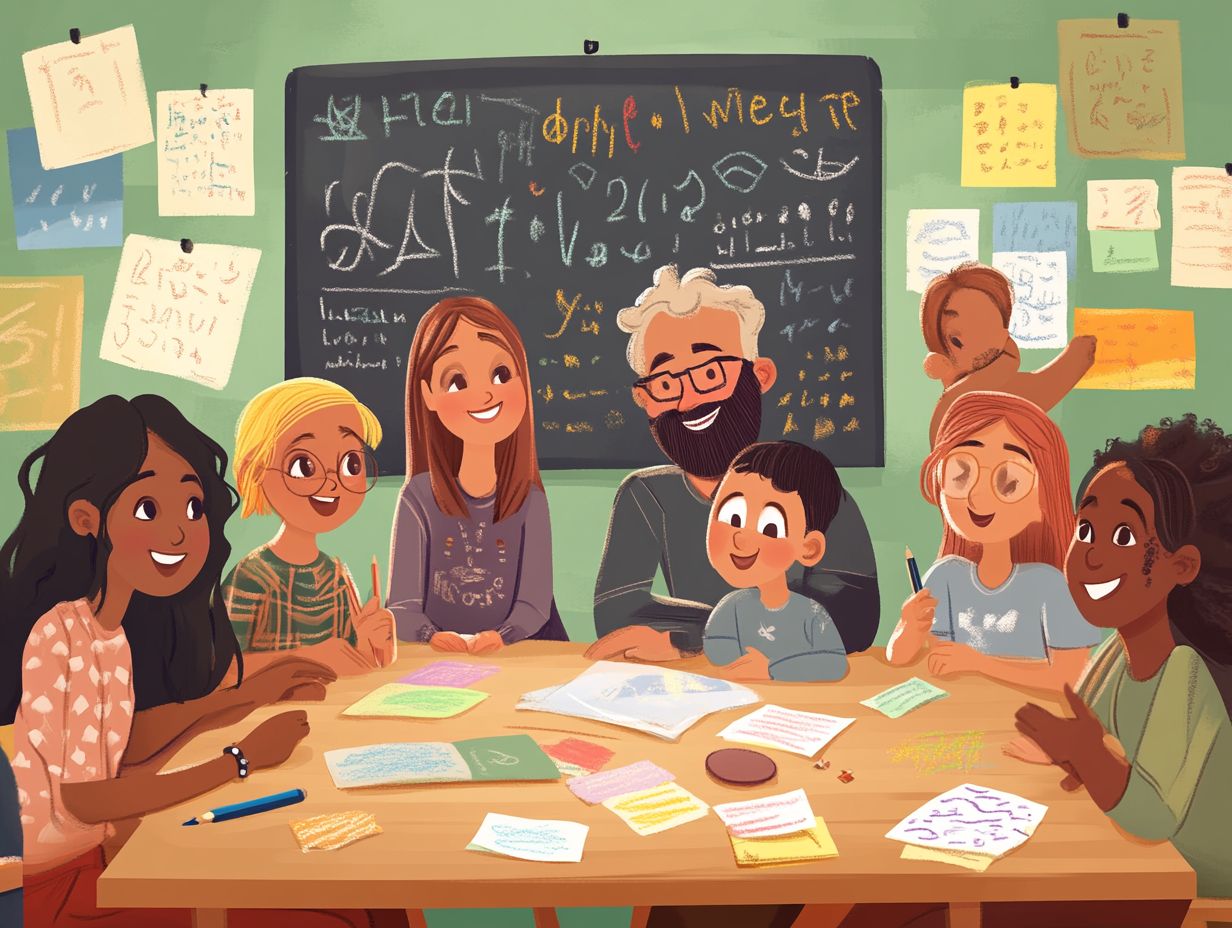What is the Best Age to Learn a Language?
Language acquisition unfolds as a captivating journey that shifts dramatically with age.
The notion of a critical period indicates that younger individuals possess a natural advantage in picking up new languages. This article explores the benefits of early language learning, the challenges faced by older learners, and important factors to consider when deciding the best age to start.
Whether you re a parent nurturing your child’s linguistic journey or an adult eager to broaden your horizons, this article offers valuable insights and practical advice for mastering a new language at any stage of life.
Contents
Key Takeaways:

Start learning a language young for big cognitive and linguistic gains. The critical period usually ends by puberty. Learning later has its challenges, like less brain flexibility and more responsibilities. Choose the best age based on your personal goals!
The Critical Period for Language Acquisition
The critical period for language acquisition is a key phase where you can achieve native-like proficiency, typically happening during your preschool years. This is the prime time to learn, as your brain is at its most adaptable, enabling effective language learning through community interactions and emotional connections.
Research shows that the age at which you begin learning significantly impacts your long-term language abilities. Optimal language acquisition occurs when children are exposed to a second language early on, enhancing cognitive skills and social motivation in the process.
Understanding the Concept of a Critical Period
The concept of a critical period in language acquisition refers to a specific timeframe when children can learn a language most effectively. At this stage, your brain is very flexible, making it easier to learn.
This allows you to pick up phonetics and grammar effortlessly through exposure and experience. However, as you age, your brain’s ability to change and adapt diminishes, making it more challenging to master the nuances of a new language.
This theory highlights the importance of age in the learning process and the complex relationship between cognitive control and language acquisition. Consequently, older learners may find it necessary to rely more on explicit learning strategies such as direct instruction and conscious practice to achieve proficiency.
Benefits of Learning a Language at a Young Age
Starting to learn a language early opens doors to amazing cognitive and linguistic benefits, nurturing the ability to speak two languages that significantly enhances your language skills and pronunciation.
Early exposure fosters a deep emotional connection with the language, leading to greater engagement and better retention. By using effective educational techniques, you can seamlessly navigate between languages and cultural nuances, ultimately boosting your overall language proficiency.
Cognitive and Linguistic Advantages

The cognitive and linguistic advantages of early language learning are remarkable. They contribute to improved cognitive skills that enhance your problem-solving and multitasking abilities.
When you engage in speaking two languages from a young age, you often show superior cognitive control, an essential skill for managing complex tasks and making sound decisions under pressure. This heightened mental agility can significantly aid your language development as you switch between different linguistic frameworks.
Exposure to different languages often leads to higher academic achievements. You ll likely find that you possess a richer vocabulary and improved comprehension skills.
Emphasizing early bilingual experiences not only nurtures your ability to communicate effectively but also sets a strong foundation for lifelong cognitive resilience.
Challenges of Learning a Language Later in Life
Learning a language later in life presents distinctive challenges that can impede your proficiency, especially if you’re an adult learner struggling to forge an emotional connection with new languages.
These hurdles often arise from a reduced ability to adapt to new information, making it challenging to embrace effective teaching methods that enhance language acquisition.
Factors That May Affect Language Learning Ability
Several factors can significantly influence your language learning ability, including age, cognitive skills, and social motivation. Community exposure and social interactions are paramount in developing language proficiency.
When you engage with native speakers and cultivate genuine connections, you create immersive environments that enhance your practical language use and understanding. Being integrated into a community that speaks your target language allows you to absorb not just vocabulary and grammar rules but also the cultural nuances that enrich your communication.
Social interactions also encourage you to practice your skills in real-time, offering valuable feedback that boosts your confidence. Rich social engagement serves as a bridge to deeper comprehension and fluency, transforming abstract concepts into practical knowledge.
Factors to Consider When Choosing the Best Age to Learn a Language
Selecting the optimal age to learn a language requires thoughtful consideration of various personal factors and learning objectives, including parental expectations and individual language preferences.
Personal Factors and Learning Goals

Personal factors, such as your individual interests and past language experiences, play a pivotal role in shaping your learning goals for language acquisition. These elements not only set the stage for your motivation but also influence the resources and methods you choose for your learning journey.
If you ve traveled extensively, you might be naturally inclined towards conversational practice. Conversely, if you have a deep-seated passion for literature, you may gravitate towards reading and writing in your target language.
Don t overlook the influence of your surrounding community; regular interaction with native speakers or immersion in cultural settings can significantly enhance your learning experience. This real-world exposure often acts as a catalyst for a deeper understanding of grammar rules and colloquialisms, ultimately leading to a more effective and enriching language acquisition journey.
Tips for Learning a Language at Any Age
No matter your age, mastering a language can be an exciting journey when you use the right tips and strategies.
Dive into the language today through dedicated immersion programs or by engaging with reputable language learning centers. These resources can significantly enhance your journey to fluency.
Effective Strategies and Resources
Effective strategies for mastering a language involve surrounding yourself with the language in daily life and engaging in tasks that elevate your practical skills. These approaches not only offer valuable context but also transform the learning journey into a more enjoyable and impactful experience.
Embracing technology, such as language quizzing apps, allows you to reinforce vocabulary and grammar rules through interactive exercises that track your progress and adapt to your level. By participating in virtual language exchange platforms, you can practice conversational skills in real time with native speakers, mimicking real-world interactions.
Immersion whether through travel or consuming media in your target language enables you to absorb cultural nuances, pronunciation, and idiomatic expressions. This ultimately fosters a deeper connection to the language, enriching your learning experience.
Frequently Asked Questions
What is the Best Age to Learn a Language?

The best age to learn a language varies from person to person. However, studies have shown that the earlier a child is exposed to a language, the easier it is for them to learn and become fluent in it.
Is there an optimal age to start learning a language?
The best age to start learning a language is between 3 and 7 years old. At this stage, children’s brains are growing and are very open to new information.
Can adults learn a language as easily as children?
Children have a natural advantage, but adults can also learn a new language with dedication. They can use their life experiences to help them along the way.
What are the benefits of learning a language at a young age?
Learning a language early offers many benefits. It enhances thinking skills, opens doors to better job opportunities, and deepens cultural understanding.
Is it ever too late to learn a language?
There’s no time like the present to start learning! While kids may pick up languages faster, adults can still achieve fluency with consistent practice.
What are some tips for learning a language at any age?
Immerse yourself in the language! Listen to music, watch shows, and practice speaking with native speakers. Remember to be patient; learning takes time and effort.






